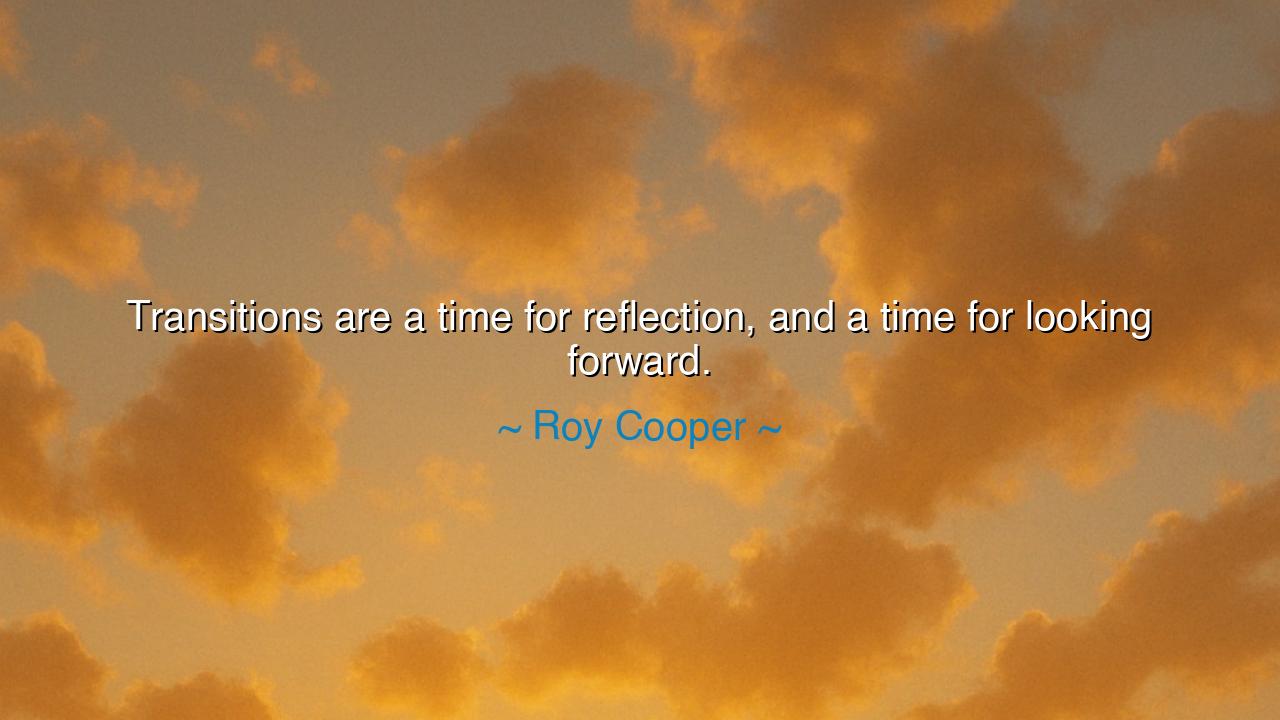
Transitions are a time for reflection, and a time for looking






The words of Roy Cooper—“Transitions are a time for reflection, and a time for looking forward.”—speak with the calm authority of one who has seen seasons of change and understands their sacred weight. Life is never static; it is a river that carries us from one shore to another, through childhood, youth, labor, love, loss, and old age. In each crossing, in each transition, there lies a holy pause—a chance to look back upon what has been and to gather strength for what lies ahead. To rush blindly through change is to squander its wisdom, but to reflect and look forward is to turn transition into transformation.
The ancients knew this truth well. The Greeks honored the god Janus, who looked both backward and forward, embodying the threshold between past and future. At every gateway, every beginning, they paused to give reverence to him, for they understood that moments of change are not mere interruptions but turning points of destiny. Cooper’s words are a modern echo of this timeless wisdom: reflection and foresight are the twin guardians that guide us through the uncertain corridors of change.
History gives us luminous examples of this truth. Consider George Washington at the end of the Revolutionary War. As he resigned his commission before Congress, he paused to reflect on the sacrifices made, the lives lost, the struggles endured. Yet at the same time, he looked forward, laying down power so that a republic might rise free from tyranny. That transition—from war to peace, from soldier to statesman—became a model for all leaders who would follow. It was his reflection that honored the past, and his vision that secured the future.
So too in personal life, we see this wisdom at work. When Nelson Mandela left prison after twenty-seven years, he did not march forth consumed by bitterness. He reflected on the pain, the injustice, the chains that had bound him—but he also looked forward, choosing reconciliation over revenge. His transition was not only the turning of his own life but of an entire nation. By holding both reflection and vision together, he transformed suffering into hope and the weight of the past into fuel for the future.
Beloved listener, the meaning is clear: when you stand at a threshold, do not rush. A transition is not simply the end of one thing and the start of another—it is the sacred moment in between, where the heart can weigh its lessons and set its compass. To reflect without looking forward is to sink into nostalgia; to look forward without reflection is to repeat old mistakes. Only when both are embraced does the soul move forward in wisdom.
The lesson for us is practical and profound: when life changes—whether through loss, success, a new beginning, or an ending—pause. Ask yourself: What have I learned? What do I carry forward? What must I leave behind? Then turn your eyes to the horizon and ask: What new possibilities await? What kind of person must I become to meet them? This union of reflection and vision transforms mere change into true growth.
So let Cooper’s words guide you through the passages of your own life: “Transitions are a time for reflection, and a time for looking forward.” Embrace the past without being chained by it. Embrace the future without fearing it. Stand in the doorway of change as the ancients once stood before their temples—grateful for what has been, hopeful for what will be. For in every transition lies not only the end of a chapter, but the beginning of a greater story.






AAdministratorAdministrator
Welcome, honored guests. Please leave a comment, we will respond soon